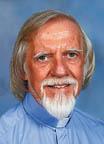
By Barb Arland-Fye
Father Ed Dunn wondered how he, a Roman Catholic priest in the Davenport Diocese, could speak to Jewish people in a Detroit suburb about the Holocaust.
But that’s the invitation he received: to address Congregation Beth Shalom in Oak Park on the evening of April 20 during its observance of Yom HaShoah, Holocaust remembrance day.
The unusual invitation has its origins in a news story last August from Oxford, Iowa, about the death of one of Fr. Dunn’s parishioners, James Hoyt. The story made international headlines because Hoyt was one of four U.S. soldiers to first see Germany’s Buchenwald Concentration Camp. That shocking experience left Hoyt, a rural mail carrier, unable to speak about the memory for decades. Fr. Dunn presided at Hoyt’s funeral at St. Mary Parish in Oxford, and excerpts from his poignant homily were carried in news stories about Hoyt.
Steven Weiss, executive director of Congregation Beth Shalom, read that story on the Internet and decided to contact Fr. Dunn.
“In reaching out, I sensed that through him I was communicating with a living witness to the Shoah (the Holocaust); a witness with a very special perspective,” Weiss said.
Fr. Dunn’s perspective would be different from that of Jewish survivors of the Holocaust, or people like himself, Weiss said, whose own parents survived the Holocaust but lost family members to it.
Weiss said Fr. Dunn initially told him, “I don’t have a story to tell. Mr. Hoyt didn’t speak to me (about the Holocaust) until later in life.”
“That’s the story you should tell,” Weiss suggested.
“If I tell that story, people will cry,” Fr. Dunn responded.
Weiss explained that it’s important for children and adults to hear the story of the Holocaust from the perspective of witnesses as well as survivors.
“Here’s a man in your community who carried the pain of having seen this concentration camp and he somehow had to deal with that.” Weiss also admires the pastor who listened to his parishioner as he shared the burden of that pain.
Hoyt suffered from post-traumatic stress disorder. “It did affect his life so deeply,” Fr. Dunn said.
Weiss thinks Fr. Dunn’s visit also demonstrates that positive relations between Catholics and Jews happen at the grassroots level.
He referred to a line in one of Fr. Dunn’s homilies earlier this year that made a reference to the Catholic Church belonging to everybody.
“It’s about connections, with people who have a sense of humanity,” Weiss said. “Clearly, this is a man who has a sense of humanity,” added Weiss who has gotten to know Fr. Dunn through correspondence and telephone calls.
Fr. Dunn, who also is a professor at St. Ambrose University in Davenport, plans to talk earlier in the day about Jewish-Catholic relations in light of recent Vatican decisions that have raised concerns in both faith communities.
Nationally, he thinks the U.S. bishops have made good efforts to dialogue with the Jewish community. And at the diocesan level, St. Ambrose University has for years offered courses on Judaism and the Holocaust.
But the main focus of Fr. Dunn’s Yom HaShoah message will be the effect Buchenwald had on Hoyt’s life. Fr. Dunn will share a recording of Hoyt talking to students at Clear Creek Amana Middle School a number of years ago, when he finally was able to open up about his experience.
“I can’t talk to the Jewish people of the Holocaust experience in the same way that they know it,” Fr. Dunn said. But I do know what Eli Wiesel (a Holocaust survivor and award-winning writer on the subject) and so many others said; that the memory must not be lost, especially among the young.”








